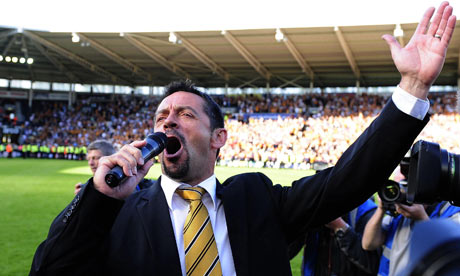
As an ardent fan of The Beach Boys, Phil Brown would probably agree that his tenure at Hull City took him on a journey from "Good Vibrations" to "God Only Knows". On paper the most successful manager in the club's history, Brown departs the KC Stadium as a widely ridiculed figure, arguably with his reputation in tatters. The consensus is that despite leading Hull into the Premier League for the first time two years ago and averting relegation last season, albeit narrowly, the 50-year-old will struggle to find a comparable post.
If grabbing a microphone and belting out a version of Sloop John B minutes after results elsewhere reprieved Hull, who had just lost at home to Manchester United, from Championship football last May raised doubts about Brown, that solo was far from his strangest moment.
Back in the autumn Hull's manager boasted to reporters about "sweet talking" a woman out of jumping off the Humber Bridge while leading his squad on a morale-boosting walk. Strangely no Hull player noticed any such exchange and the Humber Bridge Board, which monitors the crossing, has no record of the incident. When the Guardian subsequently put it to Brown that the episode had been a figment of his imagination, he looked distinctly sheepish, hung his head and eventually said: "No comment."
By then Adam Pearson had just replaced Brown's good friend Paul Duffen as Hull's chairman and rumours mounted that defeat against Stoke City in an impending game at the KC would cost the manager his job. In the event Hull won 2-1 courtesy of Jan Vennegoor of Hesselink's stoppage‑time winner. As the stadium erupted in celebration, the chairman's face remained impassive. When a companion whispered something in his ear, Pearson shrugged. Body language can be hugely misleading but it hardly looked a vote of confidence. Indeed a relationship which would limp on for four more months was very much a marriage of convenience.
Behind closed doors the chairman gave his manager an eviscerating lecture on the perils of ego and the benefits of humility. In response Brown stopped discussing his ambition to one day coach England and, extending an olive branch to players he had placed on a metaphorical "naughty step", repaired a plug he had furiously torn from the training ground's designer coffee machine.
As a qualified electrician the task was second nature to this man of many parts who, during his years as an underrated lower division right-back, also ran a restaurant, Brown's Brasserie. Later the perma-tanned, always snazzily dressed Brown would make his name as the loyal assistant many believe was behind much of Sam Allardyce's success at Bolton Wanderers.
Although a subsequent spell in charge of Derby County – a position secured after Sir Alex Ferguson, a long time admirer of his coaching skills, urged them to hire Brown – swiftly ended in dismissal, he re-emerged in Hull's backroom, taking the top job following Phil Parkinson's departure. After first warding off relegation, Brown then presided over that historic promotion to England's top tier and Hull's haul of 20 points from the first nine games of last season.
It all seemed to go to his head and, with results deteriorating, there was the infamous half-time team-talk on the Eastlands pitch when Brown publicly berated his players during a Boxing Day 2008 defeat at Manchester City. Contrary to the party line, it did not endear a now somewhat manic figure to the squad. Even so, several first-team players privately acknowledged that, behind the bombast and bluster, there was an astute football brain.
However Brown had already begun losing his nerve. Increasingly the pragmatic, cautious influence of Allardyce rather than the passing, expansionist football he had so enjoyed while playing for Bruce Rioch at Bolton informed Hull's gameplans. If he became disinclined to gamble on the pitch, his high-risk signing of the gifted but injury prone Jimmy Bullard for a club record £5m and £50,000-a-week in January 2009 backfired as the midfielder's troublesome knees betrayed him. By amplifying Pearson's misgivings, the newly fit Bullard's comedic public fight – it was witnessed by a Women's Institute march – with Nick Barmby in a Humberside park last week, hastened Brown's demise.
By the time Saturday's home defeat to Arsenal came round, Hull's manager was in uncannily prophetic mood. "This is the start of a massively important era in my life," he declared in the match programme. "And a massively important era in the history of Hull City." Brown has never been prone to understatement but, for once, he did not exaggerate.

